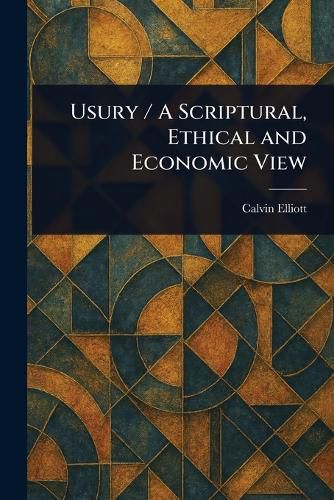Readings Newsletter
Become a Readings Member to make your shopping experience even easier.
Sign in or sign up for free!
You’re not far away from qualifying for FREE standard shipping within Australia
You’ve qualified for FREE standard shipping within Australia
The cart is loading…






This title is printed to order. This book may have been self-published. If so, we cannot guarantee the quality of the content. In the main most books will have gone through the editing process however some may not. We therefore suggest that you be aware of this before ordering this book. If in doubt check either the author or publisher’s details as we are unable to accept any returns unless they are faulty. Please contact us if you have any questions.
Explore the complex history and multifaceted nature of "Usury: A Scriptural, Ethical, and Economic View" by Calvin Elliott. This insightful work delves into the age-old practice of lending money at interest, offering a comprehensive examination through religious, moral, and financial lenses.
Elliott meticulously analyzes the ethical implications of usury, drawing upon scriptural interpretations and established economic principles. The book examines historical perspectives on interest and lending, providing a valuable resource for understanding the debates surrounding this controversial topic.
A cornerstone text for those studying finance, ethics, and religious thought, "Usury" presents a thought-provoking analysis relevant to anyone interested in the intersection of economics and morality. This carefully prepared print edition ensures the enduring accessibility of Elliott's important contribution to the discourse on usury.
This work has been selected by scholars as being culturally important, and is part of the knowledge base of civilization as we know it.
This work is in the public domain in the United States of America, and possibly other nations. Within the United States, you may freely copy and distribute this work, as no entity (individual or corporate) has a copyright on the body of the work.
Scholars believe, and we concur, that this work is important enough to be preserved, reproduced, and made generally available to the public. We appreciate your support of the preservation process, and thank you for being an important part of keeping this knowledge alive and relevant.
$9.00 standard shipping within Australia
FREE standard shipping within Australia for orders over $100.00
Express & International shipping calculated at checkout
This title is printed to order. This book may have been self-published. If so, we cannot guarantee the quality of the content. In the main most books will have gone through the editing process however some may not. We therefore suggest that you be aware of this before ordering this book. If in doubt check either the author or publisher’s details as we are unable to accept any returns unless they are faulty. Please contact us if you have any questions.
Explore the complex history and multifaceted nature of "Usury: A Scriptural, Ethical, and Economic View" by Calvin Elliott. This insightful work delves into the age-old practice of lending money at interest, offering a comprehensive examination through religious, moral, and financial lenses.
Elliott meticulously analyzes the ethical implications of usury, drawing upon scriptural interpretations and established economic principles. The book examines historical perspectives on interest and lending, providing a valuable resource for understanding the debates surrounding this controversial topic.
A cornerstone text for those studying finance, ethics, and religious thought, "Usury" presents a thought-provoking analysis relevant to anyone interested in the intersection of economics and morality. This carefully prepared print edition ensures the enduring accessibility of Elliott's important contribution to the discourse on usury.
This work has been selected by scholars as being culturally important, and is part of the knowledge base of civilization as we know it.
This work is in the public domain in the United States of America, and possibly other nations. Within the United States, you may freely copy and distribute this work, as no entity (individual or corporate) has a copyright on the body of the work.
Scholars believe, and we concur, that this work is important enough to be preserved, reproduced, and made generally available to the public. We appreciate your support of the preservation process, and thank you for being an important part of keeping this knowledge alive and relevant.